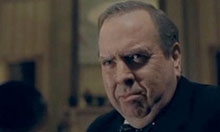In 1967 Brian Clough (Michael Sheen) was the manager of Derby County when they were drawn against Leeds United in the FA Cup. At the time, Leeds were enjoying a very successful run under their manager Don Revie (Colm Meaney) and were at the top of the first division (back when it was the top division in England). However, they were not an attractive team to watch. They had the reputation of being hard men and would regularly kick teams off the park.
So when Leeds visit bottom-of-the-second-division Derby, as well as being a lucrative tie, Brain Clough sees it as an opportunity to put his team "on the map", a validation of his managerial skills, and to befriend the great Don Revie. Leeds beat Derby in a very dirty cup game, then when Don Revie doesn't shake Brian's hand, and doesn't stay to have a drink, Brian loses all respect for Don and becomes quite hostile towards him.
Over the next season or two, Brian, along with his insightful assistant Peter Taylor (Timothy Spall), signs a few key players (not always in agreement with the man holding the financial reigns of the club: chairman Sam Longson (Jim Broadbent)) and Derby begin their rise to the top of the second division, eventually winning promotion to the first division. Brian still focusses on his feud with Don Revie, and now they can play them as "equals" in the first division. Initially the first division is hard going, many games are lost (particularly to Leeds), but against all odds, Derby win their first league championship in 1972.
Just when everything seems to be going so well, Brian gets a bit over-confident with how important he is to the club and threatens the resignation of not just himself but his assistant Peter Taylor as well, if they are not granted more secure positions. The board of directors call his bluff and let them both go. Both are shocked, but after a brief campaign by the players who don't want them to leave, a replacement is found, and Brian and Peter are on their way out of the Derby door. To Brighton! Brighton and Hove Albion agree to pay the fees that Brian and Peter are wanting, as well as paying for a holiday for both of their families in Mallorca.
It is while on this holiday that Brian is approached to take over as manager of Leeds Utd, as Don Revie has just been chosen as the new England manager. This is too good an opportunity for Brian, but Peter won't go with him, he feels he now has a commitment to Brighton. Brian has a bit of a tantrum and shouts at Peter telling him he would be nothing without him, and he leaves to go to Leeds alone.
Right from the start Brian irritates the Leeds players by telling them they can forget everything they have won because in his eyes they haven't won them fairly! Things go from bad to worse, as Leeds lose game after game, until after only forty days or so Brian is sacked, but not before he wangles a large severance deal. Brian is wracked with guilt about how he behaved to Peter, so he drives down to Brighton to apologise.
The film essentially ends there, but the epilogue tells us that Brian and Peter join together again to manage Nottingham Forest, who they also transform from lower-league club to first division champions and a two-time European Cup-winning club. We also find out that Don Revie was not a terribly successful England manager, and went to manage in the Middle East, where he was involved in financial scandals.
Phew! What a synopsis. I guess it is a bit complicated, to explain, not to understand. The film is hugely enjoyable (even my wife was getting into the film after only 10 min, and she doesn't really like football). Michael Sheen is as good as ever, getting across the charisma and sheer bloody-mindedness of Brian Clough, as well as being able to portray the more human side of him. Though Peter Taylor is a lesser role than that of Brian, Timothy Spall performs it in such a way that he is seen as being just as important as his more dominating colleague.
The football itself is kept to a minimum, often the scores of a games are shown at the bottom of the screen just after the team has run out onto the pitch. If on-the-pitch action is shown it is often to demonstrate how "physical" Leeds were as a team under Don Revie, blending historical footage of games (Billy Bremner punching Kevin Keegan) with some acted scenes that look no less real.
See time = 2:50 in this video for some quality Billy Bremner tackling!
Director Tom Hooper shows with this film the talent that serves him so well in The King's Speech. He demonstrates that he can deliver great drama with real passion, humanity and humour. I also think that the cinematography in The Damned United was Damned good. It may only have been a film about football, but some of the shots were framed beautifully. Cinematographer Ben Smithard is big fan of big skies in this film; Brian and Peter's argument in Mallorca takes place under a huge azure Mediterranean sky; some shots of football are taken from down by the players legs and pointed up at the sky, making the players seem like giants; and the final shot of the film as Brian and Peter head indoors from Peter's front garden in Brighton is framed so that the characters are dwarfed at the bottom of the shot by Brighton beach-front sky. This all gives the film a brilliant wide-open space feel to it, adding to the atmosphere.
Overall, I though it was a great film; but I also think it is very enjoyable even if you don't like football, so don't be put off it that's the case.


